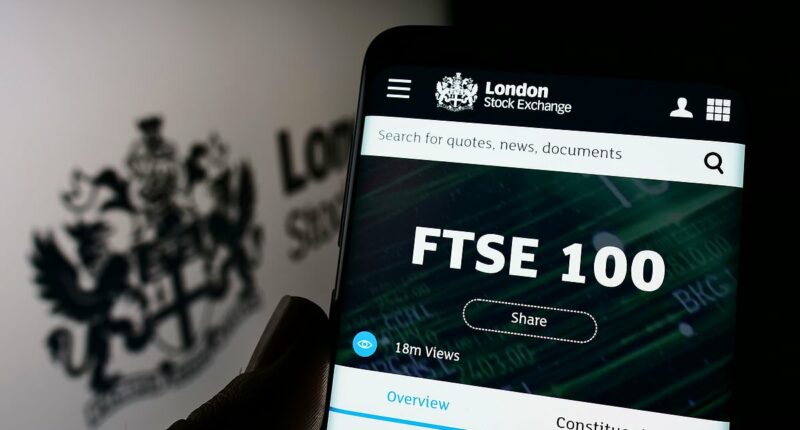Share this @internewscast.com
The FTSE 100 has soared to a new all-time high, sparking discussions about the possibility of it reaching 10,000 points by year’s end, or perhaps even sooner.
Despite facing lackluster economic indicators and volatility in other markets, the blue-chip index has managed to outshine major U.S. indices, boasting a nearly 20% increase since the beginning of the year.
Often dubbed as a market representing the ‘old economy,’ the FTSE 100 has attracted a significant influx of investors. Anticipation of an interest rate cut before the year concludes could further drive the index to unprecedented levels.
However, with the Autumn Budget on the horizon, questions arise: will the FTSE 100 experience a setback, or will investor optimism continue to prevail?

Record high: The FTSE 100 has outperformed other major indices this year to reach fresh highs
Why has the FTSE 100 performed so well in 2025?
It’s been a remarkable year for the FTSE 100, especially as other indices falter due to concerns over a potential AI bubble. Meanwhile, the FTSE keeps climbing.
Investors looking to balance their tech-heavy portfolios have turned to the London market for diversification. Additionally, lower valuations have contributed to the index’s upward trajectory.
‘The FTSE 100 trades about 14.3x earnings – to get to 10,000 only requires a modest uplift to 15x,’ says Neil Wilson of Saxo.
‘Meanwhile, the S&P 500 trades about 22.6x earnings. Relative valuations have started to matter again due to macroeconomic conditions and high terminal rates.
‘The old “there is no alternative to America” trade is no longer quite as easy as it once was.’
While some investors consider the FTSE the home for dull companies in banking and natural resources, ‘boring can also be beautiful when it comes to investing,’ says Dan Coatsworth, head of markets at AJ Bell.
Tech companies make up just 3.5 per cent of the FTSE 100 compared with around a third of the S&P 500.
Once the main reason for lagging behind North America, the UK’s ‘boring’ companies are now their biggest attraction.
‘The UK is a rich hunting ground for dividends, and it is also full of companies that have slow but steady growth and which are underappreciated engines for wealth creation.’
The blue-chip index has also become a haven for some investors troubled by issues in the US and are attracted to the FTSE’s abundance of defensive-style companies.
‘When everything looks gloomy or chaotic, such as in the depths of the Liberation Day fallout earlier this year, investors often seek solace in companies whose goods and services should be in demand no matter what’s happening in the world,’ says Coatsworth.
‘For example, we all need to pay insurance or water bills, and some consumers are likely to still buy cigarettes or vapes once they start, and the FTSE 100 has plenty of these companies on offer.’
Gold miners listed in London have done particularly well as investors look for exposure to the precious metal, with Fresnillo trading up nearly 300 per cent in the year-to-date.
Headwinds in defence and banking have also helped to push the FTSE 100 higher and ‘overarching drivers such as the higher proportion of overseas earnings paired with weakening sterling have also been a contributor,’ says Lindsay James, investment strategist at Quilter.
Will the FTSE reach 10,000 by the end of 2025?
Analysts are confident that the FTSE 100 will reach 10,000 by the end of the year.
They have set a target price of around 10,778 points, 10 per cent higher than its current level.
‘Target prices, devised by equity analysts, reflect expectations for how an index might perform over the next six to 12 months,’ says Jemma Slingo at Fidelity International.
‘While forecasts can prove accurate, they are not always reliable, as seen in 2022 when a wave of interest rate hikes derailed overly optimistic projections.’
There is no certainty that the FTSE 100 will keep on its upward trajectory, given the economic backdrop.
‘Gold miners have a habit of making blunders when times are good, and the outlook for banks is uncertain as interest rates slowly come down,’ adds Slingo.
Defence stocks are better protected with little sign that appetite is waning as European governments step up spending commitments.

Richard Hunter, head of markets at Interactive Investor says: ‘At the time of writing, the premier index has risen by 21 per cent so far this year and is just 1.25 per cent away from the psychologically important level of 10,000.
‘Indeed, a couple of further strong trading days could well see the level reach that figure before the year is out.’
There are lingering concerns that the upcoming Budget could prevent the FTSE 100 from reaching that all-important 10,000 level, though.
‘The impending Budget could well have a negative impact on consumer spending, the retailers and investor sentiment,’ says Hunter.
‘That being said, given that the constituents are estimated to earn 70 per cent of their profits from overseas, especially from the US, the index could yet be set for a Santa rally which would cap off an impressive year.’
How much impact will the Budget have on the FTSE?
The chief executives of FTSE-listed firms have been vocal in their opposition to Rachel Reeves’ last Budget, which hiked NICs on employers.
Investors will be watching the Autumn Budget with a keen eye, particularly with hefty tax rises on the table at the same time as rising unemployment.
But they will be aware aware that plenty of FTSE-listed firms are not particularly sensitive to the UK economy.
‘The Budget will be a key test for the market. Anything deemed negative for the economy could weigh on shares in the retail, banking, construction, housebuilding and property sectors,’ says Coatsworth.
‘While doom and gloom might cloud the outlook for businesses and consumers, it could also strengthen the argument for more interest rate cuts and that is traditionally positive for stock markets. It ultimately comes down to the details in the Budget as to how markets might react.’
Even if the data points to a troubling economic position for the UK, Wilson says the ‘absolute chaos…. could be a positive for the FTSE 100 because gilts and sterling are set to come under pressure, which will make the index look better and more appealing.’
The Budget could well risk damaging already fragile confidence in the economy, with implications for companies exposed to that, says James.
‘Whilst the main UK equity indices are dominated by global players, growth in the US is at risk of slowing, whilst Europe is expected to remain close to its current low growth rate.
‘In that sense, following such strong performance in 2025, equity markets are perhaps due a pullback, something that is a normal part of market behaviour.
‘However, a more substantial sell-off appears unlikely given the expectation of further cuts to rates in 2026 and continued positive corporate earnings growth.’
Steve Clayton, head of equity funds at Hargreaves Lansdown thinks the Budget will have little, if any, impact on the market.
‘t’s pretty rare for an event that has already had so many hundreds and thousands of column inches devoted to it to really deliver a lasting shock to the markets.
‘While the UK lacks tech giants like Microsoft and Nvidia, the FTSE 100 index is heavily weighted toward Value stocks. Banks, Energy producers and Miners, Tobacco Pharmaceuticals and Life Assurance stocks make up almost 50 per cent of the FTSE100’s market value.
‘Given that, there is every chance that we could see the FTSE100 scale the 10,000 market before year end.’
DIY INVESTING PLATFORMS
AJ Bell

AJ Bell
Easy investing and ready-made portfolios
Hargreaves Lansdown

Hargreaves Lansdown
Free fund dealing and investment ideas
interactive investor

interactive investor
Flat-fee investing from £4.99 per month
Freetrade

Freetrade
Investing Isa now free on basic plan
Trading 212
Trading 212
Free share dealing and no account fee
Affiliate links: If you take out a product This is Money may earn a commission. These deals are chosen by our editorial team, as we think they are worth highlighting. This does not affect our editorial independence.
Compare the best investing account for you







